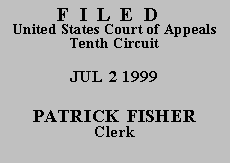

| JOE JINZO, |
|
| v. | |
| CITY OF ALBUQUERQUE; LAWRENCE RAEL, Chief Administrative Officer; ROBERT GURULE, Director of Public Works Department; CITY EMPLOYEE HEALTH CLINIC, |
Joe Jinzo originally brought this action in New Mexico state court against his former employer, the City of Albuquerque, and his former immediate supervisors (collectively, the City),(1) claiming violations of his due process and Fourth Amendment rights as well as breach of his employment contract. At the City's request, the case was removed to federal district court. Jinzo now appeals the district court's grant of summary judgment in favor of the City. We affirm.
The following facts are undisputed: In April 1994 Jinzo was terminated from his City employment for "[f]ailure to meet job qualification/certification requirements" after his driver's license was suspended for a non-work related DWI (the first termination). App. at 85. Pursuant to the City's Merit System Ordinance (MSO), Jinzo filed a grievance respecting his termination. However, prior to the grievance hearing, Jinzo and the City entered into a Stipulation of Agreement (the Agreement) which purported to settle all Jinzo's pending claims and grievances against the City. Under the terms of the Agreement, Jinzo was reinstated at a demoted position under specified conditions, including Jinzo's consent to random drug tests and his stipulation that a positive drug test would result in termination of his City employment. Jinzo reads and understands English, and he signed the Agreement after consulting with his union representatives. As provided in the Agreement, Jinzo entered the City's drug testing program. Approximately four months later he tested positive for drugs, and the City terminated him. Thereafter, Jinzo again initiated grievance procedures under the MSO. After a year and a half of related proceedings and continuances, the hearing officer recommended termination, and the Personnel Board unanimously accepted the recommendation. The MSO provides that an aggrieved employee may appeal an adverse decision to state court within thirty days. Jinzo did not file an appeal within the specified period, but, rather, brought this action more than thirty days following the adverse decision.
Jinzo's complaint alleges that the Agreement he signed with the City is an unenforceable adhesion contract, and, therefore, his consent to drug testing was an invalid waiver of his Fourth Amendment rights. He further alleges that the City's delay in processing his grievance constituted a breach of his employment contract under the MSO regulations and also violated his due process rights. The district court granted the City's motion for summary judgment after finding that Jinzo had failed to produce any evidence to support his claims. On appeal, Jinzo repeats the claims he made in his complaint. He also contends that material disputed factual issues precluded summary judgment.(2)
We review the grant of summary judgment de novo, using the same standard as the district court under Fed. R. Civ. P. 56(c). Siemon v. AT&T Corp., 117 F.3d 1173, 1175 (10th Cir. 1997). "Summary judgment is appropriate if 'there is no genuine issue as to any material fact and . . . the moving party is entitled to a judgment as a matter of law.'" Id. (quoting Fed. R. Civ. P. 56(c)). The moving party bears the initial burden of showing an absence of any issues of material fact. Celotex Corp. v. Catrett, 477 U.S. 317, 323 (1986); Kaul v. Stephan, 83 F.3d 1208, 1212 (10th Cir. 1996). Once the moving party meets this burden, the non-movant may not rest upon his pleadings, but must set forth specific facts showing a genuine issue for trial as to those matters for which he carries the burden of proof. Matsushita Elec. Indus. Co. v. Zenith Radio Corp., 475 U.S. 574, 586-87 (1986); Kaul, 83 F.3d at 1212. Mere conclusory statements are inadequate to defeat a summary judgment motion. See Nichols v. Hurley, 921 F.2d 1101, 1113 (10th Cir. 1990).
We have carefully reviewed the pleadings and briefs, the record on appeal, and the district court's decision, and we have considered them in light of the applicable law. We agree with the district court's conclusion that Jinzo failed to present any evidence sufficient to defeat the City's motion. Although Jinzo cites to his deposition testimony that he did not understand the Agreement, that conclusory statement is insufficient to withstand summary judgment.(3) Likewise, Jinzo argues that he was coerced into signing the Agreement, but he cites no evidence of coercion.
On September 17, 1998, the district court issued a thorough, well-reasoned order granting summary judgment to the City. App. at 212-25. We affirm that order for substantially the same reasons stated therein.
AFFIRMED.
ENTERED FOR THE COURT
Stephen H. Anderson
Circuit Judge
*.This order and judgment is not binding precedent, except under the doctrines of law of the case, res judicata, and collateral estoppel. The court generally disfavors the citation of orders and judgments; nevertheless, an order and judgment may be cited under the terms and conditions of 10th Cir. R. 36.3.
1.Jinzo also named the City Employee Health Clinic in his original action, but he makes no claim against the Clinic in this appeal.
2.Additionally, Jinzo raises other arguments which he did not raise in the district court. Therefore, we do not consider them. See Walker v. Mather (In re Walker), 959 F.2d 894, 896 (10th Cir. 1992).
3.We also note the referenced statement is inconsistent with Jinzo's other deposition testimony which concedes not only that there was no reason he could not understand the Agreement, but also that he asked his own union representatives about the Agreement, and they advised him to sign. App. at 189-91.